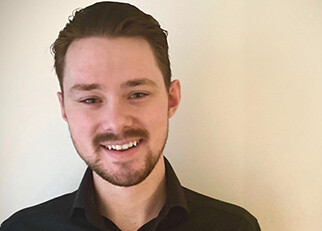
Ryan Hiebert is a second year MSc student in the Department of Laboratory Medicine & Pathobiology in the Temerty Faculty of Medicine.
Studying infectious diseases in Dr. Samira Mubareka’s lab at Sunnybrook Health Science Centre, his focus is on respiratory diseases. This meant, when the COVID-19 pandemic hit Toronto in March 2020, his transition into SARS-CoV-2 (the virus that causes COVID-19) research was a seamless, albeit dramatic transition.
Before the pandemic, Ryan was focusing on a clinical diagnostic assay (an experimental test) for respiratory viruses and other respiratory pathogens. He was testing a diagnostic tool that used genomic sequencing to diagnose viruses in a clinical setting.
As a Master’s student, his work involved going into the wards and recruiting patients, gathering and processing clinical samples to evaluate them on a novel diagnostic assay. When the pandemic hit, his research group was already in the process of collecting samples of SARS-CoV-2.
Dr. Mubareka set up The Sunnybrook Translational Research Group for Emerging and Respiratory Viruses (SERV) which had three key areas of research:
Now part of SERV, Ryan’s new focus was to study how the virus spread so they could help protect the frontline health workers dealing with a new, unknown threat.
“A lot of different regions, particularly Italy and China in the early days of the virus, did not have enough mechanical respirators for patients.” Explains Ryan. “They were using a variety of different oxygen therapies from nasal prongs and high flow nasal oxygen to BiPap machines. There wasn’t any literature that used a biological model to examine how these different respiratory modalities may affect viral transmission. We didn’t know how these different treatment methods were affecting infection rates of healthcare workers and cross-transmission of patients in hospital.”
The SERV team wanted to examine the influence these common respiratory support modalities have on how the virus spreads in the air, so the team set up a simulation laboratory where they tested many different scenarios using a mannequin model.
Read the full story Team uses simulation to study how SARS-CoV-2 spreads on the Sunnybrook Research Institute website.
“The biggest change for me was not being able to go out into the wards anymore.” Says Ryan. “My world got smaller in a sense as I spent all my time in the simulation lab.”
“I also had a renewed sense of urgency about my work. We felt it was vital, in those early days of the pandemic, to give the frontline healthcare workers as much information as possible to keep them safe,” continued Ryan, “I always knew my work had a real impact for patients but this was more intense – my research could have a direct and immediate effect on the health and safety of patients and healthcare workers. We were all working very long hours to get the data out there, it was long days and weekends, but the motivation of what we were doing, and the team environment, kept us all going.”
Having to constantly wear and mask and socially-distance in the lab changed Ryan’s day-to-day behaviour. “With the safety regulations, you really have to spend extra effort and time to plan your experiments and make sure everyone has enough space in the lab. However, everyone was very accommodating and very happy to help each other out.”
This sense of teamwork has left a huge impression on Ryan, “I have a great support team. My supervisor, Dr. Mubareka is a tremendous researcher and mentor. She's really there to help me, and everyone else in the lab, every step of the way. We have four post-doctoral fellows and a tremendous lab manager who have all mentored me through a myriad of different topics, whether it be career goals, explaining experiments, data and analysis, and new techniques. The sense of community within the lab is almost like a family.”
Ryan plans to pursue an MD/PhD, studying infectious diseases, once he completes his MSc.
“My supervisor is a medical doctor who balances her research and clinical practice – that’s inspired me to follow the same path. What drives me is being able to have a direct impact on individual health. It’s a very exciting time to be going into medicine, particularly infectious diseases.
I chose to study at LMP because I knew I’d be in an environment where I could make a direct connection between my research and human health, I just hadn’t quite expected it to be on this scale so early on in my career!”